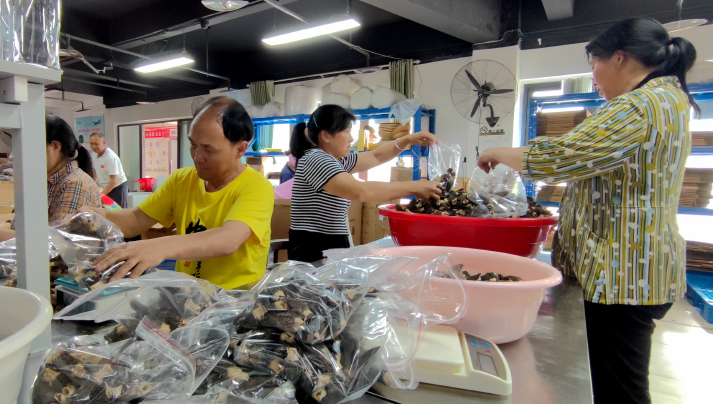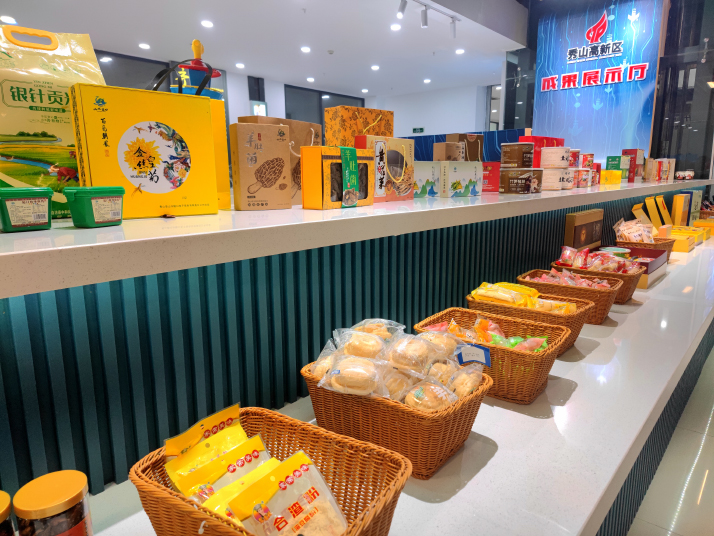| Business |
| E-commerce in Chongqing helps locals increase income | |
|
|
 Employees pack morels at an e-commerce distribution center in Qianjiang District in Chongqing Municipality on June 9 (LU YAN)
It took less than five years for Yang Qiu to transform himself from a young migrant worker in a poor village to an e-commerce entrepreneur running a business with annual sales exceeding 50 million yuan ($6.92 million). Yang is from Xiushan, a mountainous Tujia and Miao autonomous county in the southeast of Chongqing Municipality. Thanks to an e-commerce business incubator, he was able to put his entrepreneurial talent to good use by starting his own company. In Chongqing, which has an area of 82,400 square km, more than twice that of Beijing, Tianjin and Shanghai combined, similar stories are emerging every day, with e-commerce businesses facilitating the local growth and ensuring that residents can enjoy a well-off life. Start-up incubator With the support of the local government, Xiushan E-commerce Industry Incubation Park went into operation in 2015, offering a wide range of services for startups and helping them solve their problems. At that time, Yang was still traveling to different places to earn a living, working as a factory worker and then the owner of a photographic studio. In 2015, not long after his studio turned out to be a failure, Yang, then 20, heard about the incubation park by chance and went there to look for work. At first, he started as a trainee at a company incubating startups at the park, where he learned from experienced business managers about issues related to e-commerce, such as how to open an online store, how to choose products based on market conditions, how to obtain greater traffic for one's own products, and how to choose better suppliers. In 2017, Yang launched his own company. At first, his company focused on selling wooden toys, which were very popular. Later, he set his sights on the sale of agricultural produce and its processed products, including instant noodles and condiments made of chili peppers, ginger and other flavorful plants for hotpot, a signature dish of Chongqing. One of the main reasons for the business shift was that these products also help reduce poverty in Xiushan and other parts of Chongqing as producing them requires buying a large amount of produce from farmers, who previously had difficulty selling their harvests. In 2020, his company's sales during the 618 Festival, a large annual online shopping event held for around one month in the run-up to June 18, exceeded 10 million yuan ($1.38 million) for the first time. After starting his company, Yang also found time to share his experiences with other farmers from his home village about online business and arranged for the unemployed to join his company. He also encouraged more than 30 young people from previously impoverished households in the local area to start businesses with him. So far, some 300 startups and entrepreneurs like Yang have settled at the park, employing more than 6,000 people. Making use of the local government's special funding to boost e-commerce, the park offers free offices, warehouses and WiFi to the companies there, provides other services such as business training and market consultation, and helps them make connections and form partnerships. Previously a rural area with insufficient logistics services, which hindered the transportation of products, the park developed logistics routes and invited some 89 logistic providers to form a network. This strong network ensures that the quality of goods is maintained as they travel to every corner of the country in a timely manner. Through government subsidies, companies in the park also enjoy a preferential price when sending packages to customers. "In the past, it used to cost more than 10 yuan ($1.38) to send a minimum-weight package, but now 1.6 yuan ($0.22) is enough," Yang told Beijing Review. He added that previously, to send an express package over 900 km away to Guangzhou in Guangdong Province, they had to go to downtown Chongqing first, which is more than 400 km away. As a result, they could not guarantee packages would reach customers on time. "Fortunately, now we can send packages directly from Xiushan to Guangzhou, which can reach their destinations within one or two days," Yang said. With the development of rural e-commerce, local products of Xiushan have been able to get out of the mountains and reach consumers, driving local economic development and ensuring employment and people's incomes. To attract entrepreneurial young people from villages, many of whom often go to big cities for job opportunities, a commonly seen phenomenon in rural China, Xiushan recently hosted a competition for selling agricultural produce on e-commerce platforms. Winners will receive a maximum award of 60,000 yuan ($8,282) and professional assistance for their businesses.  Agricultural produce on display at the Xiushan E-commerce Industry Incubation Park in Xiushan Tujia and Miao Autonomous County in Chongqing Municipality on June 6 (LU YAN)
New lease of life In 2019, 1,531 previously poverty-stricken people were relocated out of inhospitable areas of Qianjiang Town in Chongqing, to the nearby village of Lijiaxi. Apart from having large new apartments and well-developed infrastructure, they changed their ways of making a living as well. Before their relocation, they mainly worked in their fields and raised livestock and poultry on small plots of land, barely making ends meet. After relocating, they can now work at nearby large-scale farms, industrial parks or e-commerce companies. They were transferred to Lijiaxi partly to gain better access to employment opportunities. Now, growing fruit and vegetables has become a spare-time leisure activity for residents. "What we do is transform mobile phones into new agricultural tools, live-streaming into a new agricultural activity, and data into new agricultural materials," Xu Xin, General Manager of a local commerce and trade company Nongzhanggui, told Beijing Review. Specializing in the sale of agricultural products, Nongzhanggui buys primary produce distinctive to Qianjiang and neighboring regions, for example, Qianjiang's morel mushrooms and tea oil from Youyang Tujia and Miao Autonomous County. The company then processes and packages them, and sells them through online and offline platforms under a single brand name. According to Xu, Nongzhanggui hires both full-time and part-time employees, increasing local people's incomes. Xu said the company's main challenge is expanding its market. As live-streaming has risen to become one of China's most popular selling and shopping methods, the company is now exploring this channel as a means to reach a wider customer base. Recently, Qianjiang has invited representatives of industry associations, production, supply and marketing businesses, and social media influencers to shoot videos and promote local produce, who have attracted a total of 1 million views so far. (Reporting from Hejiayan Village, Chongqing Municipality) (Print Edition Title: A New 'Farm Tool') Copyedited by G.P. Wilson Comments to luyan@cicgamericas.com |
|
||||||||||||||||||||||||||||||
|